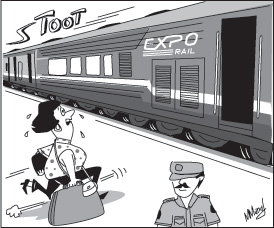The Sunday Times of May 6 reported how Jean Lambert, who headed a three member EU Parliamentary delegation here had told reporters that one thing they learnt a lot about during their visit to Sri Lanka was the importance of tanks to the local populace.
 |
| Tissa Wewa in Anuradhapura: One of the ancient tanks |
"I am not talking about military tanks but about the irrigation tanks," she had said.
John Still in his book ‘Jungle Tide’ was one of the first to mention about these two types of tanks. He wrote, “In the Great war, when so many things had to be shrouded in mystery, some genius invented the name ‘tank ‘as a cloak for a new form of mobile artillery: With no reason of war to excuse it, the same thing happens in Ceylon and the word tank there indicates not iron or cement cisterns but the finest system of the ancient Sinhalese culture and the most beautiful feature of the country excepting only the mountain peaks and valleys.”
On the topic of tanks, one cannot forget R.L Brohier’s three monumental works and the more recent landmark judgment by Justice C.G Weeramantry at the International Court of Justice on the case concerning the Gabcikovo –Nagymaros Project. In his judgment while referring to the ancient irrigation system of Sri Lanka he mentioned, “According to the ancient chronicles these works were undertaken for the benefit of the country and out of compassion for all living creatures This complex of irrigation works was aimed at making the entire country a granary. They embodied the concept of development par excellence.”
In the preface to his publication of the Separate Opinion as a booklet he also mentions, “ I realized that our ancient irrigation heritage was an example par excellence of the practical application of this concept.” (Sustainable development)
So the “tanks” while being of importance to the ‘local people,’ now have acquired universal recognition as’ an example of environmental wisdom and its implications for modern law.’
The EU delegation could further enrich what they learnt about the tanks in Sri Lanka by reading these publications.
P.G.Punchihewa
Colombo 7
Expo Rail passenger enjoyed trip but almost missed Kandy train
 I had a very pleasant trip to Kandy recently aboard the Expo Rail. Booking the tickets online, Colombo and back, for two separate dates, was easy. The trip was very pleasant, with lovely scenery, especially when passing through Kadugannawa. Breakfast was served on the morning ride and tea on the afternoon ride, at no extra cost. This is a wonderful service, with two courteous stewards manning the cabin. The passengers were given a warm welcome when they boarded the train and “thanked and by-ed’ on their departure. I had vegetarian food (I could indicate that I was vegetarian when I booked my tickets). Almost everything was looked into and taken care of by Expo Rail. I had a very pleasant trip to Kandy recently aboard the Expo Rail. Booking the tickets online, Colombo and back, for two separate dates, was easy. The trip was very pleasant, with lovely scenery, especially when passing through Kadugannawa. Breakfast was served on the morning ride and tea on the afternoon ride, at no extra cost. This is a wonderful service, with two courteous stewards manning the cabin. The passengers were given a warm welcome when they boarded the train and “thanked and by-ed’ on their departure. I had vegetarian food (I could indicate that I was vegetarian when I booked my tickets). Almost everything was looked into and taken care of by Expo Rail.
However, the railway cabin I travelled in on the morning of April 8 could have done with a window-cleaning. The glass panes were a bit “misted” over, and this spoilt the view. Window glass should always be spotless and crystal clear.
I should also mention something that almost caused me to miss the train. It was not directly the fault of Expo Rail.
The Expo Rail website advises passengers to arrive 15 minutes before departure time. I turned up at the Fort Railway Station with 20 minutes to spare. I had a computer printout of the boarding pass in my hand. I produced it at the Police Post at the station entrance and was told to head in the direction of the Kandy train platform.
At the first entrance I showed my boarding pass to a khaki-clad ticket checker, who directed me to the platform of the Kandy Intercity. I was carrying a heavy suitcase. I then showed my boarding pass to a ticket checker at a second entrance, and he directed me to a man in civil clothes. This person said I should present my boarding pass at the counter at the main station entrance. I had to stand in a queue. It was 6.56 a.m. The train was leaving at 7. I ran through the second entrance and boarded the train just in time. Why was I not directed to the ticket counter outside the Fort Station in the first place?
On my return journey, on April 19, I arrived early for the Expo Rail 3 p.m. train to Colombo. I mentioned my April 8 experience to the cabin stewards. They said the boarding pass printout with barcode was accepted by Expo Rail. They said they would never turn away a passenger who produced a computer printout with the passenger’s name and other details, including barcode.
Expo Rail should instruct all railway personnel in khaki uniforms, including the ticket checkers, that the computer printout with barcode is sufficient to board the Expo Rail. Many of the station staff do not know this. This would save passengers a lot of trouble.
Thank you, Expo Rail. Please keep up the good work.
Pushpi
Train passenger
Rs. 9,500 duty for 4 bottles of shampoo!
On receiving a notice to say I had received a parcel from overseas, I proceeded to the Post Office on D. R. Wijewardene Mawatha to collect the parcel sent by my niece in England.
As I have difficulty walking, I sent my driver to pick up the parcel. He came back to the car with a young Post Office employee who wanted to identify me as the recipient of the parcel. It took about one hour to clear the parcel, and I had to pay Rs. 9,683 in duty – for four bottles of shampoo! Fortunately, I had just cashed Rs. 10,000 from the bank. If the parcel had not consisted of shampoos that my neice had bought and taken the trouble to air mail to me I would have gladly told the employee to keep the parcel.
If there has been some mistake I would like a reimbursement of my money.
This letter is to draw the attention of people who receive parcels from overseas that it might not be worth the trouble and expense to go and pick it up.
Surani de Silva
Mt. Lavinia
Unfair billing for electricity
Because of a manpower shortage, the Ceylon Electricity Board (CEB) meter readers have to cover extra-wide areas and visit more than their normal quota of residences and commercial units. The result is that they turn up one week to 10 days before the expected date to read the meter and make up the bill. This is unfair to consumers who try to manage their bills so as to stay within the 30-day tariff plan of 90 units per 30-day month.
Last month, for the first time, our electricity bill was calculated after 24 days. Our last bill was dated March 29.
In April, our electricity consumption was 73 units. But the meter reader calculated our bill according to the next higher tariff plan, so I had to pay Rs. 922, with fuel charge. This is almost Rs. 400 more than the monthly average I pay for electricity. Three days after I received my bill, my meter read 81 units, which brought us within the 90-units-per-30 days tariff plan.
If the charges are calculated before the 30-day period ends, the CEB should compensate by giving the consumer at least 1 to 3 extra units.
I lodged a complaint by e-mail to the CEB at eleccomplaints@sltnet.lk. I have still not received a reply.
K. M. K. Kumarasinghe
Pilimatalawa, Kandy
Kandy needs permanent solutions to stray dog problem
I was horrified to learn (In the Sunday Times Plus of 6/5) that the street dogs of Kandy have not only been legitimised, but also bear the Governor’s stamp of approval.
Some years ago too, there was a much vaunted campaign where the dogs were rounded up, and vaccinated and spayed. The red collars did not last very long and road-side ‘litters’ were a frequent sight.
I have often wondered whether annual vaccinations were carried out. To identify the dogs due for immunisation would be an impossible task.
The canine community will now continue to reign as first citizens of Kandy, lounging around in residential areas, rummaging in garbage bins leaving an unsightly mess, wandering into our gardens and even open verandahs to deposit their “offerings”, and disrupting our sleep at night.
There is no such thing as an innocuous dog bite. A dog’s saliva teems with bacteria, including the tetanus causing clostridia bacillus. As no vaccination certificate can be produced, the hapless victim has to be immunised, at tremendous cost to the Health Department, (several thousands of Rupees).
Instead of basking in the glow of meritorious actions, it is high time that the Kandy Municipality with the help of the “Kandy Association for Animal Welfare” behaves in a more practical manner and comes up with a permanent solution to the stray dog problem.
It is certainly not acceptable to continue with the status quo of large populations of homeless strays struggling to survive in urban areas. The ideal solution would be to have canine ‘establishments’ in unpopulated areas where these dogs are cared for by responsible staff as they do in India.
Dr. P. Amerasinghe
Kandy |


 I had a very pleasant trip to Kandy recently aboard the Expo Rail. Booking the tickets online, Colombo and back, for two separate dates, was easy. The trip was very pleasant, with lovely scenery, especially when passing through Kadugannawa. Breakfast was served on the morning ride and tea on the afternoon ride, at no extra cost. This is a wonderful service, with two courteous stewards manning the cabin. The passengers were given a warm welcome when they boarded the train and “thanked and by-ed’ on their departure. I had vegetarian food (I could indicate that I was vegetarian when I booked my tickets). Almost everything was looked into and taken care of by Expo Rail.
I had a very pleasant trip to Kandy recently aboard the Expo Rail. Booking the tickets online, Colombo and back, for two separate dates, was easy. The trip was very pleasant, with lovely scenery, especially when passing through Kadugannawa. Breakfast was served on the morning ride and tea on the afternoon ride, at no extra cost. This is a wonderful service, with two courteous stewards manning the cabin. The passengers were given a warm welcome when they boarded the train and “thanked and by-ed’ on their departure. I had vegetarian food (I could indicate that I was vegetarian when I booked my tickets). Almost everything was looked into and taken care of by Expo Rail.